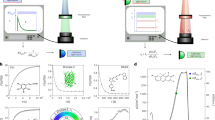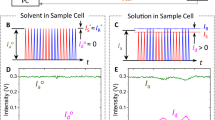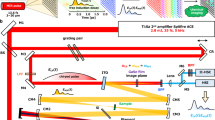Abstract
WE have recently completed the construction of an infra-red spectrometer, which, by the automatic balancing of two beams of radiation from the same source, is designed to eliminate variations in the spectrum caused by atmospheric absorption, changes in source radiation intensity, and drifts in the electronic amplification. The infra-red absorption spectrum of any chemical compound can thus be recorded directly as percentage of radiation absorbed versus wave-length. If in solution, the solvent can be placed in the other beam, and the absorption due to the compound alone can thus be ascertained.
This is a preview of subscription content, access via your institution
Access options
Subscribe to this journal
Receive 51 print issues and online access
$199.00 per year
only $3.90 per issue
Buy this article
- Purchase on Springer Link
- Instant access to full article PDF
Prices may be subject to local taxes which are calculated during checkout
Similar content being viewed by others
References
Wright, N., and Herscher, L., J. Opt. Soc. Amer., 37, 211 (1947).
Baird, W. S., O'Bryan, H. M., Ogden, G., and Lee, D., J. Opt. Soc. Amer., 37, 754 (1947).
Author information
Authors and Affiliations
Rights and permissions
About this article
Cite this article
BROWNLIE, I., CUMMING, W. An Automatic Recording Infra-Red Spectrometer. Nature 164, 105–106 (1949). https://doi.org/10.1038/164105b0
Issue Date:
DOI: https://doi.org/10.1038/164105b0
Comments
By submitting a comment you agree to abide by our Terms and Community Guidelines. If you find something abusive or that does not comply with our terms or guidelines please flag it as inappropriate.



